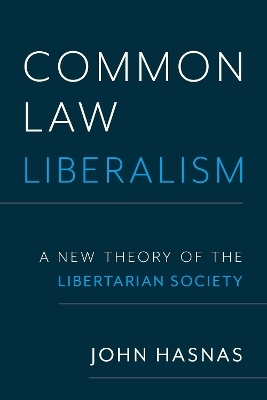
Common Law Liberalism
Oxford University Press Inc (Verlag)
978-0-19-778460-0 (ISBN)
- Lieferbar (Termin unbekannt)
- Versandkostenfrei innerhalb Deutschlands
- Auch auf Rechnung
- Verfügbarkeit in der Filiale vor Ort prüfen
- Artikel merken
Hasnas argues that there are options beyond the unregulated market or a market regulated by consciously created government law. Instead, he suggests, law can arise through a process of unplanned evolution in which those subject to law are bound, but not by the will of any identifiable human beings. Anglo-American common law, which evolved without a guiding human intelligence, showcases this. Over the centuries of its development, the common law process created the rules of contract, property, tort, and commercial law that define key aspects of liberal society. Common law's decentralized and continually evolving nature renders it resistant to political rent-seeking and responsive to changing economic and social conditions--allowing it to adapt to the needs of those it serves to protect, rather than to the desires of a powerful few.
Hasnas suggests that while the enforcement of law may involve coercion, law in and of itself is not destined to be a vehicle for domination. Common Law Liberalism demonstrates that the common law can provide all rules necessary to sustain a peaceful, prosperous, liberal society--without intervention by politically created legislation and the exploitation and oppression it so often engenders.
John Hasnas is Professor of Ethics at Georgetown University's McDonough School of Business, Professor of Law (by courtesy) at Georgetown Law Center, and the Executive Director of the Georgetown Institute for the Study of Markets and Ethics. He received his BA in Philosophy from Lafayette College, his JD and PhD in Legal Philosophy from Duke University, and his LLM in Legal Education from Temple Law School.
Introduction
Part I Questioning Assumptions
Chapter 1: Whither Criminal Law?
Chapter 2: Market Failure, Regulation, and Invisible Gorillas
Chapter 3: Two Theories of Environmental Regulation
Part II Applications
Chapter 4: Empirical Natural Rights
Chapter 5: Freedom of Speech and the Return of the Invisible Gorilla
Part III Anarchy
Chapter 6: The Law of Anarchy
Chapter 7: Can an Anarchist Have a Moral Duty to Obey the Law?
Chapter 8: The Obviousness of Anarchy
| Erscheinungsdatum | 28.07.2024 |
|---|---|
| Zusatzinfo | 4 b/w illustrations |
| Verlagsort | New York |
| Sprache | englisch |
| Maße | 148 x 212 mm |
| Gewicht | 503 g |
| Themenwelt | Geisteswissenschaften ► Philosophie ► Ethik |
| Recht / Steuern ► Allgemeines / Lexika | |
| Recht / Steuern ► EU / Internationales Recht | |
| ISBN-10 | 0-19-778460-7 / 0197784607 |
| ISBN-13 | 978-0-19-778460-0 / 9780197784600 |
| Zustand | Neuware |
| Haben Sie eine Frage zum Produkt? |
aus dem Bereich


